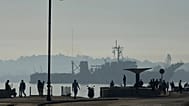Turkey's ambition to join the European Union has gone through multiple ups and downs since the application was first submitted in 1987.
Turkey knows a thing or two about being on the doorstep of the European Union.
 ADVERTISEMENT
ADVERTISEMENT
 ADVERTISEMENT
ADVERTISEMENT
The country of almost 85 million people holds the unfortunate record of the longest process to join the bloc: 36 years – and counting. No other candidate state in Eastern Europe or the Western Balkans comes even close to matching Turkey's protracted path to EU membership.
In fact, since Turkey submitted its official application on 14 April 1987 to be part of what was then the European Economic Community (EEC), 16 countries have seen their bids green-lighted, making Ankara's omission even more glaring.
After a continued succession of ups and downs, promises and threats, it has become apparent that Turkey's accession is a unique case of policy-making that Brussels has not quite learned how to manage.
From Atatürk to Hallstein
To understand Turkey's EU ambitions, we must go all the way back to the days of Mustafa Kemal Atatürk, the revolutionary leader who resisted the country's partition in the aftermath of World War I and forced the victorious Allies to negotiate favourable terms under the Treaty of Lausanne.
This paved the way for the proclamation of the Republic of Turkey on 29 October 1923 as a one-party parliamentary system with a president, Atatürk himself, as head of state.
Atatürk then launched an intense and rapid series of reforms to build a modern, Westernised country: in the span of a decade, the newly-formed republic saw the abolition of the Caliphate, the introduction of a Latin-script alphabet, a raft of European-inspired laws, drastic changes in dressing codes and the enactment of secularism in the constitution.
The radical transformation paid off. In 1949, Turkey was among the first countries to join the Council of Europe, the Strasbourg-based human rights organisation. In 1952, it became a member of NATO, the transatlantic military alliance created in direct opposition to the Soviet Union.
By then, Ankara had set its sights on the nascent project of European integration in Western Europe. In 1959, the country applied to become an associate member of the European Economic Community (EEC), a request granted four years later.
"Turkey is part of Europe," declared Walter Hallstein, the president of the EEC Commission, while celebrating the signature of the association agreement in September 1963.
"It is an event without parallel in the history of the influence exerted by European culture and politics. I would even say that we sense in it a certain kinship with the most modern of European developments: the unification of Europe."
But a first major roadblock was erected in the summer of 1974 when Turkish troops invaded the northern part of Cyprus in response to a coup d'état sponsored by the Greek military junta. The conflict split the island in two, a division that still looms large over Turkey's European dreams.
A long-awaited declaration
Nevertheless, the association agreement provided Ankara with a solid foundation to gradually move forward.
In 1987, Turkey formally submitted its application to join the EEC, then made up of 12 members, including Greece. At the time, Turkey's GDP per capita was $1,700 – a far cry from the over $16,000 in both Germany and France.
The huge economic gap, coupled with the collapse of the Soviet Union, the reunification of Germany and persistently poor relations with Cyprus and Greece, slowed down Ankara's bid.
During this time, Turkey was expected to carry out additional reforms to meet the so-called Copenhagen criteria, the fundamental rules that determine a country's eligibility to join the EU. The criteria, laid down in 1993, impose high standards on democracy, the rule of law, human rights, the protection of minorities and an open market economy.
In the meantime, Brussels offered Ankara an intermediate step in the form of a customs union for the trade of goods other than agriculture, coal and steel, which became fully operational in early 1996.
It wasn't until December 1999 when EU leaders, during a European Council in Helsinki, unanimously declared Turkey a candidate country, opening the door for Ankara to join their ranks on an equal footing.
"Turkey is a candidate State destined to join the Union on the basis of the same criteria as applied to the other candidate States," the leaders wrote in their joint conclusions.
The declaration was not merely rhetorical: it gave Turkey access to millions of EU funds in pre-accession assistance.
The absorption capacity
The 2004 enlargement saw the EU move decisively Eastwards and welcome a total of 10 new members, many of which had been subject to the iron fist of the Soviet Union.
For Ankara, it was an awkward affair: the country had submitted its bid well before any of the newcomers, including Cyprus, and was still waiting for the accession process to kick off.
In 2005, the Council finally adopted the framework for negotiations, a nine-page document peppered with references to the rule of law, the EU's "absorption capacity," the importance of "good neighbourly relations" and the possible suspension of talks.
"The shared objective of the negotiations is accession. These negotiations are an open-ended process, the outcome of which cannot be guaranteed beforehand," the document says.
"If Turkey is not in a position to assume in full all the obligations of membership, it must be ensured that Turkey is fully anchored in the European structures through the strongest possible bond."
The framework served as the main guidelines for the European Commission, which was tasked with steering the negotiations. The talks are split into 35 chapters, a highly complex undertaking that is meant to perfectly align the candidate with all EU rules.
The chapter on science and research was the first one to be opened in 2006 and was provisionally concluded that very same year. In the decade that followed, Turkey, under the leadership of Recep Tayyip Erdoğan, managed to open an additional 15 chapters.
But none were closed.
Total standstill
The 2000s marked a period of impressive economic growth for Turkey: its GDP per capita more than tripled, from $3,100 in 2001 to $10,615 in 2010, while services rapidly expanded thanks to sectors such as transport, tourism and finance, deepening the country's modernisation.
Still, the evolution was not enough to overcome tensions in the Mediterranean and the growing reticence among EU leaders, some of whom began suggesting a full-time membership could be replaced by a "privileged partnership" – a big no for Ankara.
"Between accession and (special) partnership, which Turkey says it does not accept, there is a path of equilibrium that we can find," French President Nicolas Sarkozy said in 2011. "The best way of getting out of what risks being a deadlock is to find a compromise."
In response to cautionary words coming from Paris, Berlin and Vienna, Erdoğan raised the stakes and said he expected accession to be completed by 2023 to coincide with the republic's 100th anniversary. The migration crisis of 2015-2016 gave Turkey political leverage as the country standing between the bloc and millions of Syrian and Afghan refugees.
But things went sour after the July 2016 coup d'état attempt, a critical episode that led Erdoğan to strengthen his grip on power and consolidate what critics decried as a one-man rule.
In November of that year, Members of the European Parliament approved a resolution blasting the "disproportionate repressive measures" introduced under the state of emergency and calling for a "temporary freeze" on accession talks.
The 2017 referendum to install a unitary presidential system granting the head of state vast executive powers further undermined Ankara's application and fuelled criticism from EU officials and lawmakers, with some even questioning if Turkey could still be considered an eligible candidate according to the Copenhagen criteria.
The fast deterioration culminated in June 2018 when member states put negotiations on hold.
"The Council notes that Turkey has been moving further away from the European Union," said the conclusions from a meeting in June 2018. "Turkey's accession negotiations have therefore effectively come to a standstill and no further chapters can be considered for opening or closing."
Since then, progress has been almost non-existent.
Freed from the expectation of having to meet EU standards, Erdoğan has ramped up his denunciations against the West, ordered controversial drilling operations in the Eastern Mediterranean and maintained active ties with Vladimir Putin despite Russia's full-scale invasion of Ukraine.
Ties with Brussels have gone so awry that Turkey, which technically speaking is still a candidate country, is now suspected of helping Russia evade EU sanctions.
The 2022 enlargement report released by the European Commission offered a sombre assessment of where things stand now.
"The Turkish government has not reversed the negative trend in relation to reform, despite its repeated commitment to EU accession," the report reads. "The EU's serious concerns on the continued deterioration of democracy, the rule of law, fundamental rights and the independence of the judiciary have not been addressed."
















